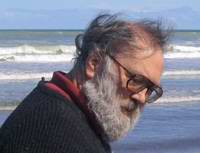I have selected Mark's version, though Matthew's is virtually identical. Mark tells us that it was spikenard; Matthew only that it was precious. Mark gives its value as 300 pence; Matthew tells us only that it might have been sold for much.
This is another of the great neglected passages of the Bible, along with the Sermon on the Mount and its grossly impractical admonition to "resist not evil".
Remember that it was immediately after this incident that Judas went out and betrayed him — Judas who had been the treasurer and purchasing officer for the disciples, the dispenser of charity on their behalf, the financial planner and budgeter; Judas who had been increasingly impatient for his master to rise and claim the kingship that was prophesied and set the world to rights; and Judas, who, despairing of him, set forth to force the issue.
In Judas and Jesus we see the two faces of Christianity, seeking "good" and seeking God.
The woman with the spikenard had recognised herself to be in the presence of God and honoured that experience and that presence.
One of the chief objections that the Roman Catholic Church voiced in respect of the "heretic" Quietists was that they valued the mystical experience of the presence of God in its own right.
It was not necessary to perform miracles of healing, it was not necessary to lead armies against the English, or found monastic orders, or put the government and the world to rights to validate that experience.
These early spiritual hippies understood quite clearly that they were to seek first the kingdom of God and that the rest would follow. Surely there would be good works to do, and the poor to succour, for as Jesus reminded his disciples, the poor are always with us. He also reminded them of his own imminent departure. But the experience of the presence of God was primary - and transformative. It was the leaven in the dough.
Not even the great mystics were constantly "in the presence"; none could command it at will. The high points were often separated by long, seemingly-barren periods.
Joel Goldsmith, founder of The Infinite Way movement, is one modern teacher who understood this well. He was adamant that seeking the kingdom of God came first. His students were admonished over and again that they were under no circumstances to set about consciously fighting evil or poverty or sickness.
Their task was simply to "realise", to make real, the presence of God, to learn to recognise that Christ presence in themselves and in others and allow it to manifest in their surroundings. Period. Full stop. End of story. They were on no account to attempt to "use God" for any purpose, however "good", they were simply to make of themselves surrendered vehicles through which the divine energy might become manifest. And manifest it did.
Jesus maintained that He was the son of God, but also, (John 1:12) "... as many as received Him, to them gave He power to become the sons of God ..." and He said: (John 14:12) "He that believeth on Me, the works that I do shall he do also; and greater works than these shall he do."
He also said, of Himself, (John 14:10) "Believest thou not that I am in the Father, and the Father in Me? the words that I speak unto you I speak not of Myself: but the Father that dwelleth in Me, He doeth the works."
In Jesus' terms, the same Christ in Him, the "Father that dwelleth in me [that] doeth the works", is within all of us. We have to learn to recognise it and we have to learn how to release its energy into the world around us, without seeking to direct or control it for our own purposes.
-o0o-



